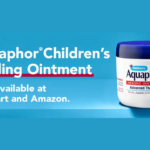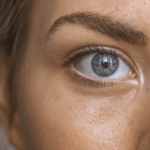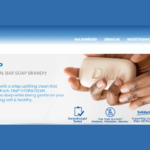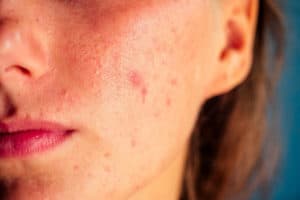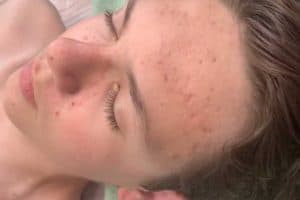Pimples are a common skin condition that affects many people, especially during adolescence. While most pimples go away on their own, some can be stubborn and take longer to heal. In some cases, pimples may even pop twice, which can be frustrating and confusing for those experiencing them.
So, why do some pimples pop twice? According to dermatologists, there are a few reasons why this might happen. One possible reason is that the pimple was not fully drained the first time it was popped.
As a result, some of the pus and bacteria may still be present in the pore, causing the pimple to become inflamed and fill up again.
Another reason why pimples may pop twice is that the pore may have been damaged during the first attempt at popping. When the skin is punctured, it can create a small wound that may take time to heal.
If the pore is not given enough time to heal and close up, it may become clogged with bacteria and oil once again, leading to a second round of inflammation.
Why Some Pimples Pop Twice

Pimples are a common skin condition that affects people of all ages. According to Medical News Today, they can be caused by a variety of factors, including excess oil production, bacteria, and hormonal changes. Some pimples can be more stubborn than others, and may even pop twice.
When a pimple pops, it releases the contents of the pore onto the surface of the skin. However, sometimes the pore doesn’t fully empty, and the pimple may refill with oil and bacteria. This can result in a second, smaller pimple forming in the same spot a few days later.
Pimples that pop twice are more common in people who have a tendency to pick at their skin. When a pimple is squeezed or picked, it can cause trauma to the surrounding skin and tissue. This can lead to inflammation and the formation of a cyst or pustule.
Cysts and pustules are types of pimples that are more likely to pop twice. Cysts are large, painful bumps that are filled with pus and can take several weeks to heal. Pustules are small, inflamed bumps that are filled with pus and can be easily popped.
The appearance and structure of a pimple can also play a role in whether it pops twice. Pimples that are deep within the skin, such as cysts, are more likely to pop twice because they are harder to fully empty.
Pimples that are close to the surface of the skin, such as pustules, are more likely to fully empty when popped.
In summary, pimples that pop twice are usually caused by a combination of factors, including excess oil production, bacteria, and skin trauma. People who have a tendency to pick at their skin are more likely to experience pimples that pop twice.
Cysts and pustules are types of pimples that are more likely to pop twice, while the appearance and structure of a pimple can also play a role.
Types of Acne
Acne is a common skin condition that affects many people worldwide. It is caused by the overproduction of oil in the skin, which can lead to clogged pores and the formation of pimples. There are several types of acne, each with its own unique characteristics and treatment options.
Comedonal Acne
Comedonal acne is a type of acne that is characterized by the presence of blackheads and whiteheads. Blackheads occur when the pores become clogged with oil and dead skin cells, while whiteheads occur when the pores become clogged with oil and bacteria.
This type of acne is typically mild and can be treated with over-the-counter products that contain salicylic acid or benzoyl peroxide.
Inflammatory Acne
Inflammatory acne is a more severe form of acne that is characterized by the presence of red bumps, pustules, and nodules.
This type of acne is caused by inflammation in the skin and can be painful and uncomfortable. Inflammatory acne can be treated with prescription medications, such as antibiotics and topical retinoids.
Cystic Acne
Cystic acne is a type of acne that is characterized by the presence of large, painful cysts and nodules. This type of acne is caused by inflammation deep in the skin and can be difficult to treat.
Cystic acne can be treated with prescription medications, such as isotretinoin, and may require the help of a dermatologist.
Overall, understanding the different types of acne can help individuals better manage their condition and find the most effective treatment options. It is important to seek the advice of a dermatologist if acne is severe or persistent, as they can provide personalized treatment recommendations.
Proper Pimple Popping Techniques

Popping pimples can be tempting, but it’s important to do it safely and gently to avoid causing further damage to the skin. Here are some tips for proper pimple popping techniques:
- Wash hands and face: Before popping a pimple, it’s important to wash your hands and face with a gentle cleanser. This will help prevent the spread of bacteria and reduce the risk of infection.
- Apply warm compress: Applying a warm compress to the pimple can help soften the skin and make it easier to extract the contents. Simply soak a clean cloth in warm water and apply it to the pimple for a few minutes.
- Use a sterilized tool: It’s important to use a sterilized tool, such as a comedone extractor, to avoid introducing bacteria into the pimple. Sterilize the tool with rubbing alcohol before use.
- Gently extract contents: When extracting the contents of the pimple, be gentle and avoid applying too much pressure. This can cause the pimple to burst and spread bacteria to other areas of the skin.
- Apply antiseptic: After popping the pimple, apply an antiseptic, such as benzoyl peroxide or tea tree oil, to help prevent infection and promote healing.
Remember, popping pimples should only be done when necessary and with caution. If the pimple is not ready to be popped or if it is in a sensitive area, it’s best to leave it alone and let it heal on its own.
Potential Risks and Complications
While popping a pimple can be tempting, it is important to be aware of the potential risks and complications that come with it. These risks can range from minor skin irritation to more serious infections and scarring.
One of the most common risks associated with popping pimples is scarring. When the skin is broken, it can lead to the formation of scars. These scars can be difficult to treat and may require medical intervention. In some cases, the scars can be permanent and affect the individual’s self-esteem.
Another potential risk of popping pimples is infection. Pimples are caused by bacteria, and when they are popped, the bacteria can spread to other areas of the skin.
This can lead to an infection, which can cause the pimple to become more inflamed and sore. In rare cases, an infection can lead to a more serious condition, such as cellulitis.
Bleeding is another potential complication of popping pimples. When the skin is broken, it can bleed. While this is usually not a serious issue, it can be messy and uncomfortable. In some cases, the bleeding can be more severe and require medical attention.
In addition to the physical risks, popping pimples can also lead to emotional distress. Many people feel embarrassed or ashamed of their acne, and popping pimples can exacerbate these feelings. This can lead to a cycle of anxiety and stress that can be difficult to break.
It is also important to note that popping pimples does not reduce the risk of skin cancer. While some people believe that popping pimples can help prevent skin cancer, this is not true.
The best way to prevent skin cancer is to protect the skin from the sun and to have any suspicious moles or spots checked by a dermatologist.
Overall, while popping pimples may seem like a quick fix, it is important to be aware of the potential risks and complications. Individuals should consider seeking medical advice from a dermatologist before attempting to pop pimples.
Treatment Options

When it comes to treating pimples that pop twice, there are several options available. These treatments can be categorized into three main categories: topical treatments, oral medications, and procedural treatments.
Topical Treatments
Topical treatments are applied directly to the skin and can be purchased over-the-counter or prescribed by a dermatologist. Some of the most common topical treatments for pimples include benzoyl peroxide, salicylic acid, and retinoids.
Benzoyl peroxide works by killing the bacteria that causes pimples. It also helps to unclog pores and reduce inflammation. Salicylic acid, on the other hand, helps to unclog pores and reduce inflammation by exfoliating the skin.
Retinoids are a type of vitamin A that can help to improve the overall appearance of the skin by reducing the size of pores and improving skin texture.
Oral Medications
Oral medications are taken by mouth and can be prescribed by a dermatologist. Antibiotics are commonly prescribed to treat pimples that pop twice. They work by killing the bacteria that causes pimples and reducing inflammation.
Birth control pills or oral contraceptives can also be prescribed to women to help regulate hormones that can contribute to the development of pimples.
Another oral medication that can be used to treat pimples is spironolactone. This medication works by reducing the amount of oil produced by the skin and can be particularly effective for women with hormonal acne.
Procedural Treatments
Procedural treatments are performed by a dermatologist and can include cortisone injections and other prescription medications.
Cortisone injections can be used to quickly reduce inflammation and swelling in a pimple that has popped twice. Prescription medications like isotretinoin can also be used to treat severe cases of acne.
In conclusion, there are several treatment options available for pimples that pop twice. Topical treatments, oral medications, and procedural treatments can all be effective in reducing inflammation, killing bacteria, and improving the overall appearance of the skin.
It is important to consult with a dermatologist to determine the best treatment plan for your individual needs.
Preventive Measures
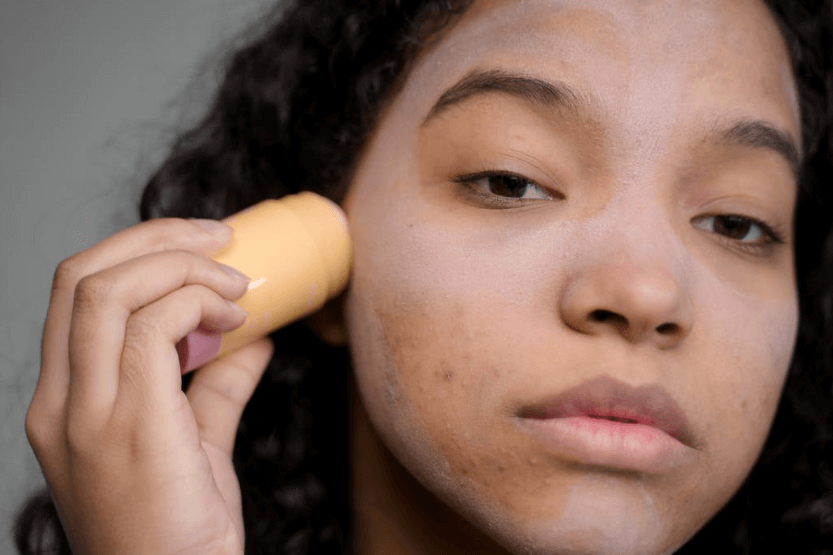
While some pimples may pop twice, it is always better to prevent them from occurring in the first place. Here are some preventive measures that one can follow to reduce the chances of getting pimples:
Regular Exfoliation
Exfoliating the skin regularly can help remove dead skin cells and prevent clogging of pores. This can be done using a gentle scrub or exfoliating cleanser. However, it is important not to over-exfoliate as this can irritate the skin and cause more pimples.
Moisturize
Moisturizing the skin is important to keep it hydrated and prevent dryness. Using a moisturizer that is non-comedogenic can help prevent clogging of pores and reduce the chances of getting pimples.
Sun Protection
Protecting the skin from the harmful UV rays of the sun is important to prevent damage to the skin and reduce the chances of getting pimples. Using a sunscreen with an SPF of at least 30 can help protect the skin from the sun.
Washcloth
Using a clean washcloth to wash the face can help remove dirt and oil from the skin and prevent clogging of pores. It is important to use a clean washcloth every time to prevent the spread of bacteria.
Skincare Products
Using skincare products that are non-comedogenic and suitable for one’s skin type can help prevent clogging of pores and reduce the chances of getting pimples. It is important to read the labels carefully and avoid using products that contain harsh chemicals that can irritate the skin.
It’s super frustrating, I totally get it. From what I’ve seen, these preventive measures can really help cut down on those pesky pimples and stop them from popping up twice.
Check out my article that talks about how long it takes for a pimple to go away here!
In Closing
In conclusion, pimples that pop twice can be frustrating and confusing. While some people may think that they have a second pimple in the same spot, it is more likely that the first pimple was not fully removed and has become inflamed again.
If you are experiencing pimples that pop twice, it is important to resist the urge to pick at them. Instead, seek the advice of a dermatologist who can help you determine the underlying cause of your acne and recommend appropriate treatment options.
Dermatologists are medical professionals who specialize in the diagnosis and treatment of skin conditions, including acne. They can provide personalized treatment plans based on your individual needs and help you achieve clear, healthy skin.
Remember, treating acne takes time and patience. With the help of a dermatologist and a consistent skincare routine, you can achieve the clear, healthy skin that you deserve.

